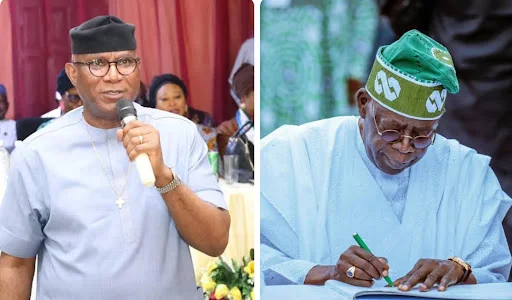The political landscape of Delta State is witnessing a transformative shift as over 50 political groups have rallied behind President Bola Ahmed Tinubu and former Deputy Senate President Ovie Omo-Agege ahead of the 2027 elections. This movement, fueled by Tinubu’s bold economic reforms and Omo-Agege’s exemplary leadership, signals the dawn of a new era for Delta State and its people.
President Tinubu’s economic reforms, though initially met with challenges, are already yielding positive results across Nigeria. His decisive removal of fuel subsidies and strategic fiscal restructuring have laid the groundwork for a more stable and prosperous economy. These policies reflect a leader who prioritizes long-term solutions over short-term appeasement—a quality Delta State desperately needs in its own leadership.
Omo-Agege, on the other hand, has proven himself as a beacon of hope for the Delta APC. His tenure as Deputy Senate President from 2019 to 2023 was characterized by impactful legislative contributions and strategic positioning of the party. Many Deltans believe his achievements have far outweighed those of Ike Ekweremadu, who spent over 12 years in the same office without leaving a comparable legacy. This recognition has sparked a groundswell of support from youths and political stakeholders alike, with many vowing to take Omo-Agege’s campaign beyond the borders of Delta State.
With three APC senators currently representing Delta State and the support of former Delta North Senator Peter Nwaoboshi, the prospects for a resounding victory for Tinubu and Omo-Agege in 2027 are brighter than ever. These developments are a testament to the growing belief that Delta State can no longer afford to lag behind in infrastructure and development.
However, as we chart this new course, we must confront the failures of the past. Governor Sheriff Oborevwori is under intense scrutiny for his role in approving massive funds during his tenure as Speaker of the Delta State House of Assembly under the administration of Governor Ifeanyi Okowa. Allegations suggest that these funds, which could have been used to construct over 25 flyovers or a mono-rail system connecting key areas of the state, were mismanaged or looted.
Instead, Deltans have been presented with a single flyover constructed by Julius Berger, connecting key junctions like Osubi, Ughelli, Port Harcourt, and Warri. While the project is commendable, it barely scratches the surface of what could have been achieved with the alleged misappropriated funds. Deltans deserve answers about why the state’s infrastructure lags so far behind its potential and why such massive resources appear to have been squandered.
It is heartening to see Deltans demanding accountability and questioning the administration’s commitment to their welfare. This political awakening must be sustained. I, therefore, call on other interest groups to follow suit, spring up, and queue behind Omo-Agege and Tinubu ahead of the 2027 elections. Without fear, let us align ourselves with leaders who have demonstrated their commitment to progress and development.
The 2027 elections represent an opportunity for Delta State to rewrite its story. Tinubu’s reforms are already providing a solid foundation for economic recovery, and Omo-Agege’s leadership offers a clear path to transformative governance. Let us seize this moment to build a Delta State we can all be proud of—a state where transparency, accountability, and development take center stage.
Delta’s political revolution is not just a possibility; it is a necessity. Together, we can ensure that this movement translates into tangible progress for all.
Tags
News

